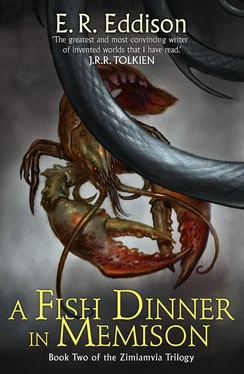And if this is the true case of us and our lives and loves and all that we care for, then Why is it?
Ah, Love! Could you and I with Him conspire
To grasp this sorry Scheme of Things entire,
Would not we shatter it to bits – and then
Re-mould it nearer to the Heart’s Desire!
Why not? Why is there Evil in the world?
Such, in rapid and superficial survey, are the ultimate problems of existence; ‘riddles of the Sphinx’ which, in one shape or another, have puzzled men’s minds and remained without any final answer since history began, and will doubtless continue to puzzle and elude so long as mankind continues upon this planet.
But though it is true that (as contrasted with the special sciences) little progress has been made in philosophy: that we have not today superseded Plato and Aristotle in the sense in which modern medicine has superseded Hippokrates and Galen: yet, on the negative side and particularly in metaphysics, definite progress has been made.
Descartes’ Cogito ergo sum – ‘I think; therefore I exist’ – has been criticized not because its assumptions are too modest, but because they are too large. Logically it can be reduced to cogito , and even that has been shorn of the implied ego . That is to say, the momentary fact of consciousness is the only reality that cannot logically be doubted; for the mere act of doubting, being an act of consciousness, is of itself immediate proof of the existence of that which was to be the object of doubt.
Consciousness is therefore the fundamental reality, and all metaphysical systems or dogmas which found themselves on any other basis are demonstrably fantastic. In particular, materialistic philosophies of every kind and degree are fantastic.
But, because demonstrably fantastic, they are not therefore demonstrably false. We cannot, for instance, be reasonably driven to admit that some external substance called ‘matter’ is prior to or condition of consciousness; but just as little can we reasonably deny the possibility of such a state of things. For, logically, denial is as inadmissible as assertion, when we face the ultimate problems of existence outside the strait moment of consciousness which is all that certainly remains to us after the Cartesian analysis. Descartes, it is true, did not leave it at that. But he had cleared the way for Hume and Kant to show that, briefly, every assumption which he himself or any other metaphysician might produce like a rabbit from the hat must have been put into the hat before being brought out. In other words, the scientific method, applied to these problems and pressed to its logical implications, leads to an agnosticism which must go to the whole of experience, as Pyrrho’s did, and not arbitrarily stop short at selected limits, as did the agnosticism of the nineteenth century. It leads, therefore, to an attitude of complete and speechless scepticism.
If we think this conclusion a reductio ad absurdum , and would seek yet some touchstone for the false and the true, we must seek it elsewhere than in pure reason. That is to say (confining the argument to serious attitudes of speculation on the ultimate problems of existence), we must at that stage abandon the scientific attitude and adopt the poet’s. By the poet’s I mean that attitude which says that ultimate truths are to be attained, if at all, in some immediate way: by vision rather than by ratiocination.
How, then, is the poet to go to work, voyaging now in alternate peril of the Scylla and Charybdis which the Cartesian–Kantian criticism has laid bare – the dumb impotence of pure reason on the one hand, and on the other a welter of disorganized fantasy through which reason of itself is powerless to choose a way, since to reason (in these problems) ‘all things are possible’ and no fantasy likelier than another to be true?
Reason, as we have seen, reached a certain bed-rock, exiguous but unshakable, by means of a criticism based on credibility: it cleared away vast superfluities of baseless system and dogma by divesting itself of all beliefs that it was possible to doubt. In the same way, may it not be possible to reach a certain bed-rock among the chaos of fantasy by means of a criticism based not on credibility but on value?
No conscious being, we may suppose, is without desire; and if certain philosophies and religions have set up as their ideal of salvation and beatitude a condition of desirelessness, to be attained by an asceticism that stifles and starves every desire, this is no more than to say that those systems have in fact applied a criticism of values to dethrone all minor values, leaving only this state of blessedness which (notwithstanding their repudiation of desire) remains as (for their imagination at least) the one thing desirable. And in general, it can be said that no religion, no philosophy, no considered view of the world and human life and destiny, has ever been formulated without some affirmation, express or implied, of what is or is not to be desired: and it is this star, for ever unattained yet for ever sought, that shines through all great poetry, through all great music, painting, building, and works of men, through all noble deeds, loves, speculations, endurings and endeavours, and all the splendours of ‘earth and the deep sky’s ornament’ since history began, and that gives (at moments, shining through) divine perfection to some little living thing, some dolomite wall lighted as from within by the low red sunbeams, some skyscape, some woman’s eyes.
This then, whatever we name it – the thing desirable not as a means to something else, be that good or bad, high or low (as food is desirable for nourishment; money, for power; power, as a means either to tyrannize over other men or to benefit them; long life, as a means to achievement of great undertaking, or to cheat your heirs; judgement, for success in business; debauchery, for the ‘bliss proposed’; wind on the hills, for inspiration; temperance, for a fine and balanced life), but for itself alone – this, it would seem, is the one ultimate and infinite Value . By a procedure corresponding to that of Descartes when, by doubting all else, he reached through process of elimination something that he could not doubt, we have, after rejecting all things whose desirableness depends on their utility as instruments to ends beyond themselves, reached something desirable as an end in itself. What it is in concrete detail, is a question that may have as many answers as there are minds to frame them (‘In my Father’s house are many mansions’). But to deny its existence, while not a self-contradictory error palpable to reason (as is the denial of the Cartesian cogito ), is to affirm the complete futility and worthlessness of the whole of Being and Becoming.
It is not to be gainsaid that a position of complete scepticism and complete nihilism in regard to objective truth and objective value is, logically, unassailable. But since, logically, he who takes up that position must remain speechless (for nothing, ex hypothesi , can be affirmed, nor does anybody exist to listen to the affirmation), must desire nothing (for there is nothing to be desired), and do nothing (for nothing is worth doing), therefore ‘the rest is silence’.
Proceeding, then, on the alternative supposition – that is to say, accepting the fact of consciousness as our fundamental reality and this undefined but uneliminable ‘one thing desirable’ as the fundamental value – we are free to speculate on the ultimate problems of metaphysics, using as instrument of investigation our mind at large, which includes (but is not restricted to) the analytic reason. Such speculation is what, for want of a better word, I have called poetic . It might (with some danger of misconception) also be called the kind of speculation appropriate to the lunatic, or to the lover! for—
Читать дальше












